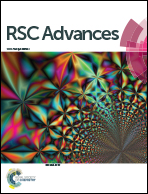Microwave treatment: a facile method for the solid state modification of potassium-promoted iron on silica Fischer–Tropsch catalysts†
Abstract
Potassium-promoted (0–1.5 wt%) iron–silica catalysts for Fischer–Tropsch synthesis (FTS) have been modified using microwave radiation. Radiation produced few or no modifications in the bulk properties, but surface and catalytic behaviour were markedly changed in K promoted 10 wt% of Fe/SiO2 (10Fe/SiO2) catalysts. The effect of potassium on CO adsorption was relatively insignificant in untreated catalysts, but was large in microwave-modified catalysts. Radiation induced an increase in CH4 formation in CO + H2 temperature programmed surface reactions. Microwave treatment promoted CH4 formation from graphitic carbon in these catalysts, while decreasing CH4 formation from α- and β-carbon species, and overall favoured strong CO adsorption onto the catalyst surface. Microwave effects were catalyst particle size and treatment duration-dependent. At low alkali concentration, microwaved samples showed improved ethene selectivities, higher alpha values and lower methane and light alkene selectivities. When 0.7 wt% K was added to the 10Fe/SiO2 catalyst, the α value increased from 0.59 to 0.66 after treatment of the sample with microwave radiation in the solid state.


 Please wait while we load your content...
Please wait while we load your content...